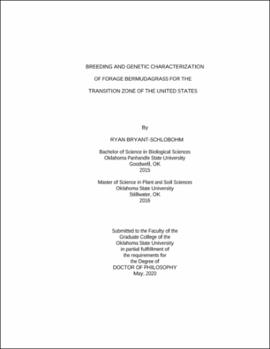| dc.contributor.advisor | Wu, Yanqi | |
| dc.contributor.author | Bryant-Schlobohm, Ryan | |
| dc.date.accessioned | 2020-09-09T21:16:26Z | |
| dc.date.available | 2020-09-09T21:16:26Z | |
| dc.date.issued | 2020-05 | |
| dc.identifier.uri | https://hdl.handle.net/11244/325489 | |
| dc.description.abstract | Bermudagrass is a robust forage option for livestock producers as both a grazed and stockpiled herbage. Breeding efforts focused on improved cold tolerance have expanded the geographic range of bermudagrass into the transition zone of the United States. However, many cold tolerant clonal hybrids experience a gap in yield potential and quality compared to southern adapted cultivars. Additionally, producers experience a limited option of seeded commercial cultivars that have the necessary adaptation for production within the transition zone. This study was conducted to genetically characterize collections of germplasm for the improvement of forage bermudagrass in the transition zone of the United States. A collection of 215 Cynodon dactylon SSR markers were identified as transferable to C. nlemfuensis, with confirmed effectiveness through a genetic diversity analysis. Transferable markers were used to identify interspecific hybrids from a cross between P3 1x7 and Tifton 68 that employed to develop a population with improved cold tolerance, yield potential, and forage quality in Stillwater and Perkins, OK. Population evaluations of 100 seeded genotypes were conducted in Goodwell, OK to characterize the genetic variation of biomass and reproductive traits, in addition to identifying elite germplasm for synthetic seeded cultivar development. Furthermore, a collection of 31 commercial cultivars and experimental accessions were characterized with SSR markers for molecular genetic diversity. Ten seeded genotypes and 25 interspecific hybrids were selected for further testing. Several trait associations were identified for indirect selection of seed and biomass yield. Furthermore, broad sense heritability estimates of interspecific hybrids displayed a significant genetic influence to adaptive trait performance. Molecular characterization confirmed a relatively narrow genetic base within current commercial cultivars. The genetic information, selections and SSR markers developed in the investigation will further enhance the capabilities of forage bermudagrass breeding, as we seek to broaden the genetic base and improve key traits for transition zone performance. | |
| dc.format | application/pdf | |
| dc.language | en_US | |
| dc.rights | Copyright is held by the author who has granted the Oklahoma State University Library the non-exclusive right to share this material in its institutional repository. Contact Digital Library Services at lib-dls@okstate.edu or 405-744-9161 for the permission policy on the use, reproduction or distribution of this material. | |
| dc.title | Breeding and genetic characterization of forage bermudagrass for the transition zone of the United States | |
| dc.contributor.committeeMember | Anderson, Michael | |
| dc.contributor.committeeMember | Rocateli, Alex | |
| dc.contributor.committeeMember | Reuter, Ryan | |
| osu.filename | BryantSchlobohm_okstate_0664D_16698.pdf | |
| osu.accesstype | Open Access | |
| dc.type.genre | Dissertation | |
| dc.type.material | Text | |
| dc.subject.keywords | bermudagrass | |
| dc.subject.keywords | genetics | |
| dc.subject.keywords | plant breeding | |
| thesis.degree.discipline | Crop Science | |
| thesis.degree.grantor | Oklahoma State University | |
